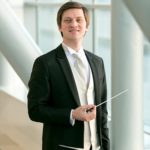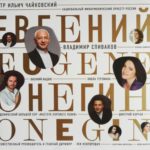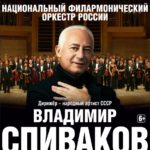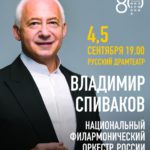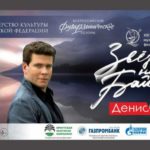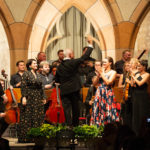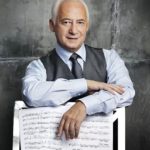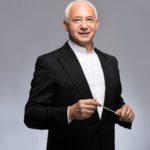Discovering the Genuine Tchaikovsky
I.V.Ohalova
Strangely as it may seem but the author's score of one of the main masterpieces by Tchaikovsky, that is the Eugene Onegin opera, which is kept at the Russian National Music Museum in Moscow, has neither been published nor described by musicologists.
There has been no serious textual analysis of the written score as compared to the first printed piano and orchestral editions of the work. This may explain the fact that even most serious musicians who are eager to suggest their readings of the opera have missed the original copy, using available published variants. The first edition of the score released by the P. Jurgenson Publishing House had become a rarity long ago.
Vladimir Spivakov, cherishing a long-time dream to perform and record the work he fell in love with when still a boy, before starting the Eugene Onegin project, turned to the very first author score which then served as the textual basis for his interpretation. (He first heard Eugene Onegin at the Opera Studio of the Rimsky-Korsakov Leningrad Conservatory when he was 12 years old.)
Spivakov's dream came true when the world-known German company b-Sharp – Music and media solutions released their recording of Tchaikovsky's opera Eugene Onegin (sound director Philipp Nedel). This excellent recording features famed representatives of the contemporary music theater such as the National Philharmonic Orchestra of Russia (artistic director and principal conductor Vladimir Spivakov), the Academic Grand Choir Masters of Choral Singing (artistic director and chief conductor Lev Kontorovich). The principal characters are sung by talented singers Hibla Gerzmava (Tatyana), Vasily Ladyuk (Onegin), Dmitry Korchak (Lensky), Yulia Mazurova (Olga), Nikolai Didenko (Gremin).
Eugene Onegin, as everybody knows, was defined by the composer as “lyrical scenes after the novel in verse by Alexander Pushkin” rather than an opera. Such attribution, given by the author, opens for performers large space and freedom in conceiving their individual approach to the great score. One can remind and compare the renditions directed by A. Melik-Pashaev and V. Nebolsin, M. Rostropovich and S. Ozawa, Yu. Temirkanov and E. Kolobov, G. Solti and T. Serafin and many other renowned Russian and foreign conductors.
However, Vladimir Spivakov, as shown above, has chosen his own way. What are the hallmarks of his interpretation? To answer the question it is necessary to mention some facts pertaining to the history of the first performances and publications.
Let us bear in mind that Tchaikovsky did not want his opus to be performed in a large opera hall with its routine production banalities. The opera's first performance was given by students of the Moscow Conservatory, essentially coevals of the main characters. (The premiere was held on March 17, 1879, on the stage of the Maly Theater under the baton of Nikolai Rubinstein.) Naturally, the conductor has worked both with the first edition (1880) which appeared immediately after the premiere, and with the second (final) edition (1891) which has become predominant in the performing practice.
Therefore owing to Vladimir Spivakov, the opera has been rediscovered in its initial form. The conductor's meticulous work has brought tangible results and amazing revelations. For instance, in the first version the opera ending differed from the one in the currently used score variant.
After Onegin's exclamation “You are mine!” there was a scenic remark “Enters Prince Gremin. Seeing him Tatyana screams and falls into his embrace. The Prince makes a sign to Onegin to retire”. For the Bolshoi's production in 1880, Tchaikovsky changed the text and scenic remarks in the Finale, thus getting closer to the ending of Pushkin's novel.
In 1885, upon I. Vsevolzhsky's request, the composer wrote two ecossaises for Scene 6. He also altered the tempi, delineated the rhythms and made several cuts. Thus Vladimir Spivakov's interpretation is an ingenious synthesis of the practically unknown 1877-1878 score and the universally used 1891 second edition.
Another trait of the interpretation is related to the dramaturgy and composition of the opera. The conductor has distinctly depicted and retained through the whole opera the contrast between two metaphoric spheres. The first and domineering sphere is connected with the destinies of the principal characters. This romantic sphere exposes a finely nuanced emotionally rich and lyrical world present in the confessions and monologues of Tatyana and Lensky. The other one can be defined as prosaic and rather far away from the poetic universe of Tatyana's dreams and Lensky's avowals.
In Act I these spheres are mutually set-off and complementary. For instance, the Scene 2 dialog of Tatyana and the Nurse going into the magnificent Letter Scene – the lyrical climax of the opera and Pushkin's novel. It is impossible not to mention Hibla Gerzmava's ethereal artistry and the sublime poetic portrayal of the heroine she created.
In Act II, devoted to Lensky's fate, there occurs a conflict between poetry and prose which ends in a tragic culmination, that is Lensky's death. One should note the wonderful playing of the Entr'act to Scene 5 foretelling this denouement. Framed by sombre fatal fanfares, Lensky's aria theme is heard in an expressive dialog of cellos and woodwinds.
In Gremin's aria at the high society ball (Act III, Scene 6), sung with great nobleness by Nikolai Didenko, Tatyana's image and the vanity of the society, strange to her and Gremin, are finely drawn. The poetry/prose antithesis vanishes only in the Finale (Scene 7). Tatyana and Onegin are truly sincere in their confessions – Onegin, passionate in his love, and Tatyana, faithful to Gremin.
Probably, every conductor turning to the Eugene Onegin score has to withstand the problem of the coherent entity compiled in this case of different lyrical scenes often quite disconnected with the previous events. The integrity and the compositional build-up belong to the most admired features of Vladimir Spivakov's rendition. This integrity is based mainly on creating the atmosphere of lyric poetry and keeping to it up to the final scene. Therefore we have the right to speak about the conductor's refined mastery and his heartfelt reading not only of Tchaikovsky's score but also of its source – Pushkin's novel in verse.
Most probably a sensitive and attentive audience, acquainted with various renditions of the “lyrical scenes”, will appraise once more the boundlessness of the masterpiece by Pushkin and Tchaikovsky. In any case professional musicians and opera lovers have got a marvelous gift – a new, profound and well conceived interpretation by one of the most gracious and free-thinking contemporary musicians.
